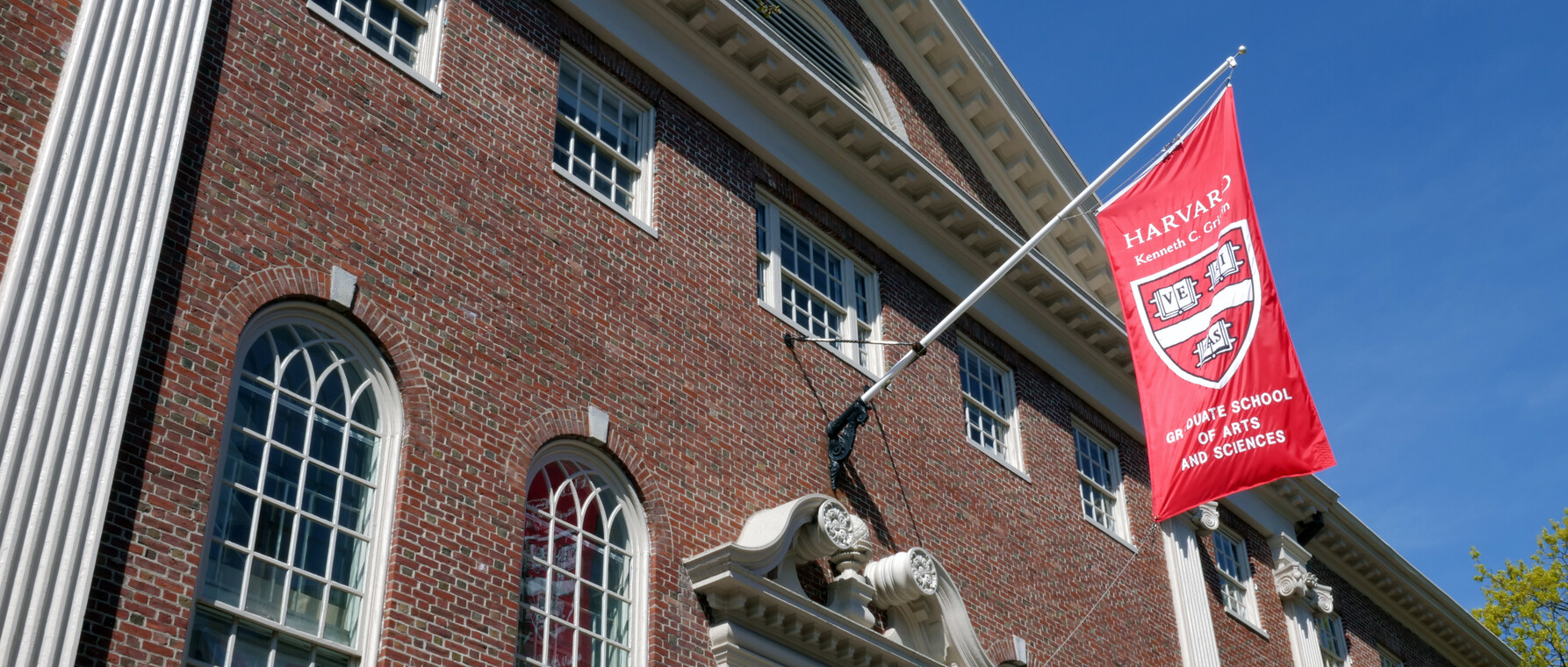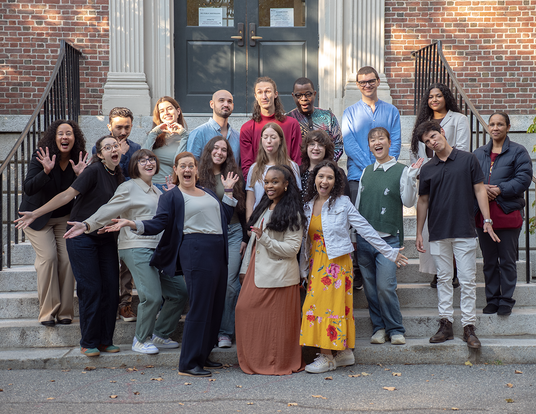GAGE-ing a Student-Centered Approach to Graduate Education
Report lays out vision for elevating the Harvard Griffin GSAS experience

Throughout last year’s celebration of the Harvard Kenneth C. Griffin Graduate School of Arts and Sciences’ (GSAS) 150th anniversary, Dean Emma Dench was repeatedly impressed by how crucial graduate students have been to Harvard’s academic preeminence—not to mention its day-to-day operations. The release earlier this month of the Report of the GSAS Admissions and Graduate Education (GAGE) Working Group puts the experience of those scholars and scientists front and center, with an eye to making it better.
“There are a lot of great things going on already in graduate programs across the University,” Dench says. “I hope this work will bolster those efforts and inspire faculty and administrators to push on further—and in new directions.”
Part of the overall strategic planning process of Harvard’s Faculty of Arts and Sciences (FAS) and a collaboration between faculty and administrators, the report is a comprehensive and data-driven document that provides both a vision and a framework for graduate education in the twenty-first century. It offers a set of recommendations that aim to support students in achieving their academic and professional goals—and thereby ensure that Harvard remains at the forefront of graduate education.
Thought Leaders
Work on the report was inspired by the recognition that graduate education faces unprecedented challenges and opportunities, such as changing academic job markets, increasing competition with peer institutions, rising costs and pressures of pursuing a PhD degree, and growing expectations and demands for teaching excellence and innovation.
To address these issues, Dench convened a committee of FAS faculty and administrative leaders from across GSAS in spring 2022 charged with “considering advising, teaching, employment outcomes, institutional finances, and equity, diversity, inclusion, and belonging to develop actionable steps in how admissions slots are allocated and to outline what the PhD means in the twenty-first century.”
“Honestly, we had been dying to do this work for some years,” says Dench, who chaired the working group. “We’d begun to formulate a public philosophy of a student-centered approach to graduate education. The FAS strategic planning process and the GAGE project gave us a formal platform that pushed and elevated our efforts so that we could do a more comprehensive job.”
In addition to reviewing data on various aspects of admissions and the Harvard Griffin GSAS experience, the committee also solicited feedback from academic partners that included the FAS Faculty Council, the Graduate Policy Committee, the Committee on Graduate Education, directors of graduate studies, and the Harvard Griffin GSAS Student Council. Despite the rigors of the commitment—which often included “homework assignments”—working group member Elizabeth Lunbeck, chair of Harvard’s Department of the History of Science, says that she found the meetings engaging and energizing.
“We established norms of spirited discussion and anything-goes questioning as we examined vast amounts of current and historical data on the impressively broad range of issues implicated in graduate education,” Lunbeck says. “As much as we learned from the data, I think it’s fair to say we learned a tremendous amount from each other—from the quite different perspectives and experiences we brought to the table. We worked hard, but throughout the process Dean Dench saw to it that our meetings were enjoyable and even fun.”
The report’s myriad findings cover topics that include student mental health, time to degree, and financial support. In the end, three areas emerge as particularly important and interrelated: advising, employment outcomes, and equity, diversity, inclusion, and belonging (EDIB).
Three Threads
The GAGE report affirms that faculty advising is a crucial factor for graduate student success and well-being. Although students generally express satisfaction with their mentors on exit surveys, a closer look at the data revealed areas of concern. The report found that lack of structure and consistency in advising, as well as ineffective or unfortunate advising relationships, were sources of stress for many graduate students. It also suggests that poor advising may contribute to longer time to degree or lower satisfaction with the PhD program.
Dench says that most students appreciate their advisors and often have strong interpersonal relationships with them. At the same time, graduate student mental health surveys show a correlation between advising and rising levels of depression or anxiety. That in mind, the working group tried to focus on the structure and expectations of the advising relationship.
“It’s stressful when expectations are unclear,” Dench says. “As someone who was a director of graduate studies, I know that it can feel harrowing for students when they don’t know if their advisor will respond in time for them to apply for a job or fellowship.”
In looking at employment outcomes, the report found that, although most graduating students are still interested in pursuing positions in higher education, they are increasingly exploring other careers as well. The majority of graduates in the natural sciences, for instance, ultimately do not end up in an academic position—an outcome that is increasingly reflected in exit surveys, with less than 50 percent listing a job in higher education as a career goal.
Dench was encouraged to see that Harvard Griffin GSAS graduates are moving into a wider variety of fields. “The reality of graduate education in the twenty-first century is that our students bring intellectual leadership to a wider and wider variety of fields,” she says. “Their skills and knowledge as researchers and teachers have value well beyond academia.”
The working group also affirmed that equity, diversity, inclusion, and belonging (EDIB) are essential factors for creating a vibrant graduate student community that reflects society and advances knowledge. “Important intellectual questions will be answered differently by students with different backgrounds, identities, and experiences,” Dench says. She and her colleagues wanted to de-emphasize the importance of credentialing in Harvard Griffin GSAS admissions and stress the need for ongoing EDIB conversations once students arrive on campus.
“We sometimes focus narrowly on who’s got a master’s degree from Oxford or Cambridge, Stanford or Yale,” she says. “We ought to be looking for promise and potential rather than what someone has already done. Then we need to work to make Harvard Griffin GSAS a place that enables students from a wide variety of backgrounds to realize that promise. That often means partnering with the School’s Office of EDIB.”
A Framework for Improvement
The committee finalized its recommendations for the GAGE report in summer 2023 after a total of 26 meetings, much data analysis, and more vigorous discussion. The working group’s recommendations span six areas of graduate education: advising; scale and strength of the academic program; equity, diversity, inclusion and belonging; employment outcomes; teaching; and finances. Because each program is different, the GAGE report does not prescribe universal solutions. Instead, it offers a framework for programs to follow, providing concrete steps to improve graduate education at Harvard and establishing a baseline standard in each area.
“What the bulk of the report does is to think deeply about how to do the absolute best job we can of putting the educational needs of our extraordinarily promising students at the front of the picture,” Dench says. “In that vein, we tried to provide a wide range of very doable suggestions.”
Many of the report’s top-line recommendations involve advising, an area of concern that touches nearly every aspect of the graduate experience. The working group proposes that graduate programs develop clear advising requirements—adapted for disciplinary differences and expectations—that span a student’s academic career and normalize conversations around effective advising. Departments should also positively encourage and facilitate students in developing a broader group of advisors and mentors that will help students achieve their academic goals—including by supporting co-advising.
In the area of employment outcomes, the report recommends that programs regularly update their curricula in response to changing academic job markets and encourage students to consider professions outside of academia. The report also found that programs should evaluate student progress early and often in order to keep pace with their personal and professional goals.
On the topic of EDIB, the working group urges admissions committees to conduct a holistic review of applicants based on their potential for excellence and their varied voices and perspectives. Departments should also engage in ongoing conversations and actions to support a diverse group of students once they are on campus.
One of the report’s most notable recommendations focuses on the area of admissions. The working group encourages departments to use as factors for admission the scale and strength of their program, the strength of advising and faculty advising loads, engagement with equity, diversity, inclusion, and belonging, the demand and opportunities for PhD graduates in the field, and the available resources and support for graduate education—not departmental teaching needs.
Finally, the report engages with the thorny issue of finances, acknowledging the challenge from peer institutions that have recently made major investments in graduate education. It urges Harvard to increase funding for graduate stipends in order to maintain the University’s leadership in higher education and to recruit and retain the most talented students in every field.
Echoing Dean Dench, GAGE committee member Peter Girguis, professor of organismic and evolutionary biology, says the report’s recommendations are practical and achievable. If well-implemented, he says they will yield more vibrant graduate programs appreciated by students and faculty alike. “Higher education is rapidly evolving, and our programs must also evolve,” he says. “My hope is that Harvard Griffin GSAS continues to promote dialogue and collaboration among the departments, divisional deans, the FAS writ large, and all the schools within the University, with the aim of ensuring that our graduate programs are well-supported and provide students with a world-class education that allows them to pursue their professional goals. That is how Harvard will produce world leaders within and beyond the academy and maintain its prominence in the academic arena.”
For a New Generation of Intellectual Leaders
A staged implementation of the GAGE recommendations will begin in fall 2023. In the months ahead, Harvard Griffin GSAS will work closely with divisional deans, the FAS dean, and other administrative partners to meet the report’s expectations. Peabody Professor of American Archaeology and Ethnology and Chair of the Department of Anthropology Matthew Liebmann, who also served on the GAGE Working Group, thinks the report can have a University-wide impact.
“I hope it will provide useful guidance for departments and programs across Harvard, ultimately resulting in an improved graduate school experience for our students and better training for the next generation of scholars,” he says. “At the end of the day, I hope the work of the GAGE committee contributes to excellent scholarship across all disciplines at Harvard.”
Dean Dench says Harvard Griffin GSAS is invested in realizing the report’s vision of enhancing the experience of graduate students and preparing alumni to become intellectual leaders in the twenty-first century. Proclaiming it “a guide for a student-centered approach to graduate education at Harvard,” Dench says she hopes the GAGE report will inspire departments to simply pick a recommendation and try something new.
“There is a huge raft of practical advice and actual measures that departments could enact tomorrow if they wanted to,” she says. “I hope the report will make departments feel good about the measures they’re already taking and help them to build on those best practices.”
Read the full GAGE report and share your thoughts and comments with the working group at gage@gsas.harvard.edu.
Get the Latest Updates
Join Our Newsletter
Subscribe to Colloquy Podcast
Simplecast





